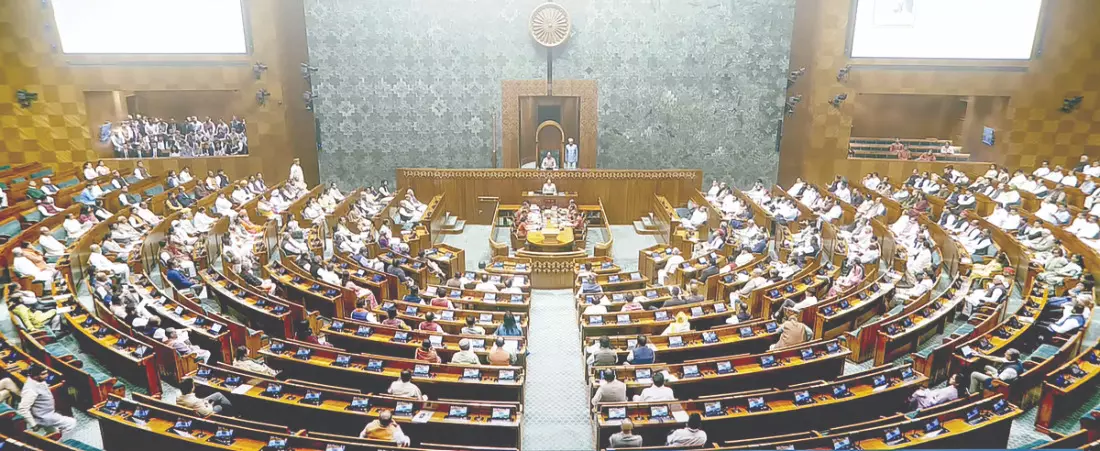Opposition’s Democratic Imperative
India’s opposition must reinvent itself as a constructive force, prioritising accountability, debate, and citizens’ interests over theatrics to strengthen Parliament as a true temple of democracy

The increasing disruptions in parliamentary proceedings in India have brought to the forefront the role of the opposition in Parliament. The opposition is a crucial component of a democratic setup, and its effectiveness is essential for ensuring accountability, transparency, and informed decision-making. In this article, we will explore the concept of opposition, its evolution, and its significance in the Indian parliamentary system. We will also examine the challenges faced by the opposition and the need for a renewed commitment to constructive debate.
Significance of Parliamentary Discussions
Parliamentary discussions are the backbone of democratic decision-making. They provide a platform for elected representatives to engage in informed debates, raise concerns, and shape policy. However, the frequent disruptions in Parliament have resulted in significant losses, both financially and in terms of productivity. The 17th Lok Sabha, for instance, held only 274 sittings, averaging 55 days per year, the lowest in parliamentary history.
Rise of the Concept of Opposition
The institution of opposition is a modern concept that emerged in ancient Rome and Greece, where limited democracy prevailed. The Westminster tradition of parliamentary opposition began to take shape in the 17th century, with statutory recognition given to the leader of the opposition in 1937. In India, the opposition emerged during British rule, with small organisations like the British Indian Association and the Indian National Congress playing a crucial role in raising the voice of the people.
Historical Trajectory of the Opposition
The historical trajectory of the opposition in India can be divided into four broad phases. The first phase (1952-1966) was characterised by a mismatch between the idea of having a robust opposition and the actions taken by the ruling party. The second phase (1967-1984) was a period of transition and experiment, depicting the opposition’s resilience. The third phase (1985-1998) witnessed the consolidation of the opposition, with the broadening of political mobilisation and participation. The fourth phase (1999-2014) was characterised by identity politics and witnessed fragmentation and the inability of the opposition parties to expand their social base.
Leader of the Opposition
In India, the role of the Leader of the Opposition is constitutionally recognised under the Salary and Allowances of Leaders of the Opposition in Parliament Act, 1977. The Leader of the Opposition is accorded a status equivalent to that of a Cabinet Minister and forms a shadow cabinet. The 2024 general election resulted in the numerically largest Opposition in the Lok Sabha, making the role of the Leader of the Opposition even more crucial.
Crisis of the Opposition
The opposition in India is facing a crisis, with roots embedded in political parties’ weak organisational strength, leadership debates, and ideological issues. The opposition needs to reinvent itself and prioritise the interests of the country and its citizens over political theatrics. Stricter rules, accountability, and a renewed commitment to constructive debate can ensure that the Indian Parliament functions as a true temple of democracy.
The Way Forward
The opposition parties need to learn from the past and reinvent themselves. A renewed opposition as a shadow cabinet can ensure that the government is held accountable and that the interests of the citizens are protected. The opposition should focus on shaping public reason, rather than just seeking power. As William Selinger notes, “dissent is not always about seizing power but about shaping public reason.”
Need for a Renewed Commitment
There is a need for a renewed commitment to constructive debate and stricter rules in Parliament. This can ensure that the Indian Parliament functions as a true temple of democracy, where elected representatives can engage in informed debates and shape policy. As Thiruvalluvar noted, “a king who has no one to criticise, who is devoid of protection, yet no one is destroyed, he is surely destroyed.”
Future of the Opposition
The future of the opposition in India depends on its ability to reinvent itself and prioritise the interests of the country and its citizens. By functioning as a shadow cabinet and promoting constructive debate, the opposition can ensure that the government is held accountable and that the interests of the citizens are protected.
Conclusion
In conclusion, the role of the opposition in Parliament is crucial for ensuring accountability, transparency, and informed decision-making. The opposition needs to prioritise the interests of the country and its citizens over political theatrics. A renewed commitment to constructive debate and stricter rules can ensure that the Indian Parliament functions as a true temple of democracy. The opposition parties need to reinvent themselves and focus on shaping public reason, rather than just seeking power.
Recommendations
Strengthen Parliamentary Institutions: Strengthening parliamentary institutions is crucial for ensuring the effective functioning of the opposition.
Promote Constructive Debate: Promoting constructive debate and ensuring accountability can help to build trust in the parliamentary system.
Renewed Commitment: A renewed commitment to constructive debate and stricter rules can ensure that the Indian Parliament functions as a true temple of democracy.
Opposition as a Shadow Cabinet: The opposition should function as a shadow cabinet, holding the government accountable and protecting the interests of the citizens.
By prioritising the interests of the country and its citizens, the opposition can play a crucial role in shaping the future of India. As Sartori observed, “the opposition’s right to oppose is not a procedural allowance, but the soul of pluralism.”
Views expressed are personal



